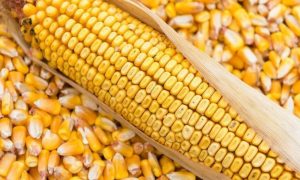Drone technology a ‘game-changer’ in agriculture sector, a shot in the arm for sustainable and eco-friendly farming

Sukhdeep Singh from Faridkot, Punjab, finds drone technology transformative for agriculture. Drones efficiently sprayed his five-acre maize field in 30 minutes, reducing water use and pesticide exposure. The Government of India’s NAMO Drone Didi scheme provides drones to farmers, enhancing efficiency, cost-effectiveness, and sustainability. Drones also cut labor costs and support eco-friendly farming practices.
Sukhdeep Singh of Bhagthala village in Faridkot district finds drone technology “a game-changer” in the agriculture sector. When his maize crop reached a critical stage, he faced the significant challenge of spraying pesticides. With towering maize stalks, traditional methods of spraying pesticides are not only inefficient but also cumbersome, often resulting in sprayers getting drenched with pesticides.
“Convincing labourers to take the spraying job is no less than a struggle even for a rate as high as Rs 1,000 per acre. High maize plants make it nearly impossible to avoid getting drenched with pesticides. Left with no option I often enter the field, reluctantly though, to perform the task,” Sukhdeep said.
During a visit to the District Agriculture Department office for some work, Sukhdeep heard officials talking about drones spraying pesticides in the fields. “Though it came as a surprise, it solved my problem,” he said. “For just Rs 200 per acre, a drone completed the task of spraying pesticides on maize spread over five acres in just half an hour, which would have taken several days by manual labourers. Traditionally, I would have needed around 100 litres of water per acre to apply pesticide effectively, but with the drone, the water usage was reduced to 10 litres per acre,” Sukhdeep said. “The results were striking. The adoption of drone technology not only simplified his farming practices but also enhanced the overall health of his maize crop. It also spared me from the arduous task of walking through tall maize plants and minimised the risk of pesticide exposure,” he said, adding: “So, I find the drone technology a game-changer in the agriculture sector.”
Several farmers in Punjab are taking a significant step forward to revolutionise the agriculture sector by adopting drone technology for spraying fertilisers/nutrients like Nano Urea and Nano Di-Ammonium Phosphate (DAP). (Express Photo)
Sukhdeep became so convinced by the drone outcomes that he now owns a drone and sprays other farmers’ crops for Rs 200 — creating an additional source of income for him. His fellow farmers from the same village Gurpreet Singh and Manpreet Singh also used dronesfor spraying pesticides on their maize and moongi crops, respectively. They are not isolated farmers using drones, several farmers in Punjab are taking a significant step forward to revolutionise the agriculture sector by adopting drone technology for spraying fertilisers/nutrients like Nano Urea and Nano Di-Ammonium Phosphate (DAP) — a shot in the arm for sustainable and eco-friendly farming. The drone technology not only increases efficiency and cost-effectiveness but also helps save fertilisers and pesticides and minimises human exposure to hazardous chemicals.
Under the Government of India’s NAMO Drone Didi scheme, IFFCO has provided 100 drones to entrepreneurs in Punjab free of cost. Of these, 93 drones have reached the state and deployed. These agricultural drones, each measuring 3.5 x 3.5 feet, come equipped with a 12-litre water tank and are provided with electric vehicles, generator sets for on-field battery charging and a 100-litre water tank to carry distilled water to the fields. A drone can cover one acre in just seven minutes, bringing efficiency and precision in nutrient application.
“The initiative not only aims to empower women but also to promote ‘Jehar Mukat Kheti’ (Poison-Free Agriculture),” said Harmail Singh Sidhu, State Marketing Manager of IFFCO. “Drone technology provides several benefits, including high efficiency and cost-effectiveness,” he said. In the traditional method, farme-rs use three 45 kg urea bags per acre per crop and one to one-and-a-half bags of DAP fertiliser. With drone technology, Nano Urea and Nano DAP, both in liquid form, are being promoted. A 500 ml bottle of nano fertilisers is sufficient for one acre, significantly reducing the environmental impact compared to conventional methods where fertilisers are sprinkled on the soil leading to a loss of up to 60 per cent of the nutrients, which goes in the air.
Pointing out the cost-effectiveness of nano fertilisers, Sidhu said “A 500 ml bottle of Nano Urea, sufficient for one acre, costs around Rs 225, compared to Rs 266.50 required for three bags of traditional urea. Sidhu, however, said, “Farmers can also use traditional methods for first application of fertilisers before plants germinate, while drones can be used in subsequent cycles, ensuring efficient coverage without damaging crops, which get damaged when labourers walk in the field on small plants for covering each portion of the field while sprinkling fertilisers.” The drone technology not only increases efficiency and cost-effectiveness but also helps save fertilisers and pesticides and minimises human exposure to hazardous chemicals. (Express Photo)
Using indigenous nano fertilisers also reduces the country’s dependency on costly imported urea and DAP, alleviating a significant financial burden. India spends a huge amount on importing urea and DAP and bears the subsidy cost, said Sidhu.
A drone is expected to cover around 4,000 acres annually, potentially earning entrepreneurs up to Rs 10 lakh per annum. The technology not only reduces labour costs — spraying charges are Rs 200-250 per acre compared to Rs 300 manually — but also ensures comprehensive coverage without damaging crops.
“The initiative heralds in a new era in the agriculture sector in Punjab, with the technology, sustainability and economic efficiency converging for the betterment of farmers and the environment alike,” said Dr Amrik Singh, Chief Agriculture Officer, Faridkot.
Punjab Agriculture Department officials said, “Drones can effectively apply pesticides, just as they do with fertilisers, particularly when crops like cotton are affected by pests. Drones cover a spray diameter of four metres and can save 25 % to 50 % of pesticides while using up to 90 % less water for spraying than conventional method.” Dr Amrik Singh said, “Under the Agriculture Infrastructure Fund, NABARD provides a 3 % interest subvention to beneficiaries, enabling farmers to purchase drones. This technology is useful for tall crops like sugarcane, maize and orchards, where traditional spraying methods are challenging.” However, drones cannot be used in red zone areas. Also anyone wishing to purchase a drone must have passed Class X and be trained in operating drones.
To read more about Ethanol Industry News, continue reading Agriinsite.com














